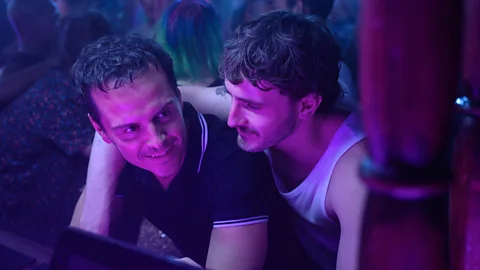Paul Mescal and Andrew Scott are heartbreaking in All of Us Strangers
 Searchlight Pictures
Searchlight PicturesPaul Mescal and Andrew Scott star alongside Claire Foy and Jamie Bell in Andrew Haigh's All of Us Strangers, a 'beautifully nuanced film' about loss, love and hope.
The plot of All of Us Strangers makes it sound like a ghost story, and the details may lead you to expect violin strings and treacly melodrama. You can put those expectations aside. Andrew Haigh's eloquent, beautifully nuanced film is something entirely different.
Warning: The article contains spoilers for the plot of All of Us Strangers
The ghosts are not ghoulish spectres but the ghosts of memory, as a middle-aged man, Adam – played by Andrew Scott at his emotionally piercing best – visits his parents, who died in a car crash just before he turned 12. Adam has a loving but clear-eyed, unsentimental view of his mother and father, played by Claire Foy and Jamie Bell with vibrant, down-to earth realism. Haigh and his cast, including Paul Mescal as Adam's new lover, give this film about loss, enduring love and hope for the future such truth and poignance that it is easily among the best of the year.
More like this:
- Rebel Moon is 'gushing Star Wars fan fiction'
From the start, Haigh creates a world with a tinge of unreality, not in its physical details – the look is crisp and clear, with slightly enhanced colours – but in its tone. When we first see Adam, his face appears gradually on screen like a photograph being developed. He lives in a new, nearly-empty London high-rise and the eerie silence and isolation is the perfect backdrop for the loneliness evident on his face. A screenwriter, he is working on a story about his parents. What he has so far is: EXT. SUBURBAN HOUSE 1987.
Harry, a younger man played by Mescal with charm and a mischievous grin, is another tenant in the high-rise who one night drunkenly turns up at Adam's door and invites himself in. Adam declines, one of many instances where Haigh remains true to this self-protective character. Soon, and tentatively, Adam changes his mind. The two men become sexual partners, possibly heading toward love.
Haigh, who has created psychologically sensitive stories in 45 Years (2015) and Weekend (2011), expertly balances that forward-looking relationship with Adam's visits to the past. Researching his screenplay, he goes to the house where he lived as a boy and stands outside. Then, in a nearby park he runs into his father, looking just as he was before he died, who takes him back the house and his mother. The furniture hasn't changed since Adam lived there; he is home. Adam's grief is specific, but the film effectively plays off the common wish to revisit those we have lost, to fill them in on our lives and to ask the questions we never could.
These ghosts exist entirely in Adam's imagination, yet they have such life that you suspect he might be a very good screenwriter. The family acknowledge that they haven't seen each other in some time, but don't yet speak about death. In two of the most honest and wrenching scenes, Adam visits each of his parents alone. When his mother asks if he has a girlfriend and he tells her he's gay, she reacts not as he'd wish her to, but with the disappointment he suspects she really might have had. Left in the 1980s, she tells him, in Haigh's pitch-perfect dialogue, "They say it's a very lonely kind of life" and asks, "Don't you want to marry and have children">window._taboola = window._taboola || []; _taboola.push({ mode: 'alternating-thumbnails-a', container: 'taboola-below-article', placement: 'Below Article', target_type: 'mix' });
